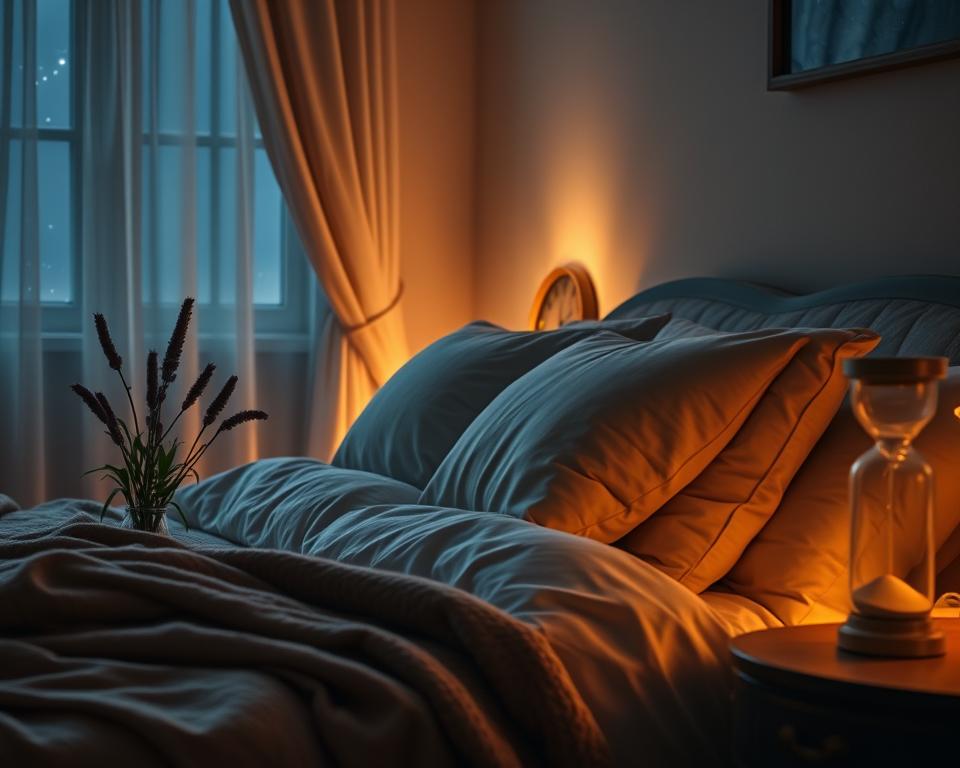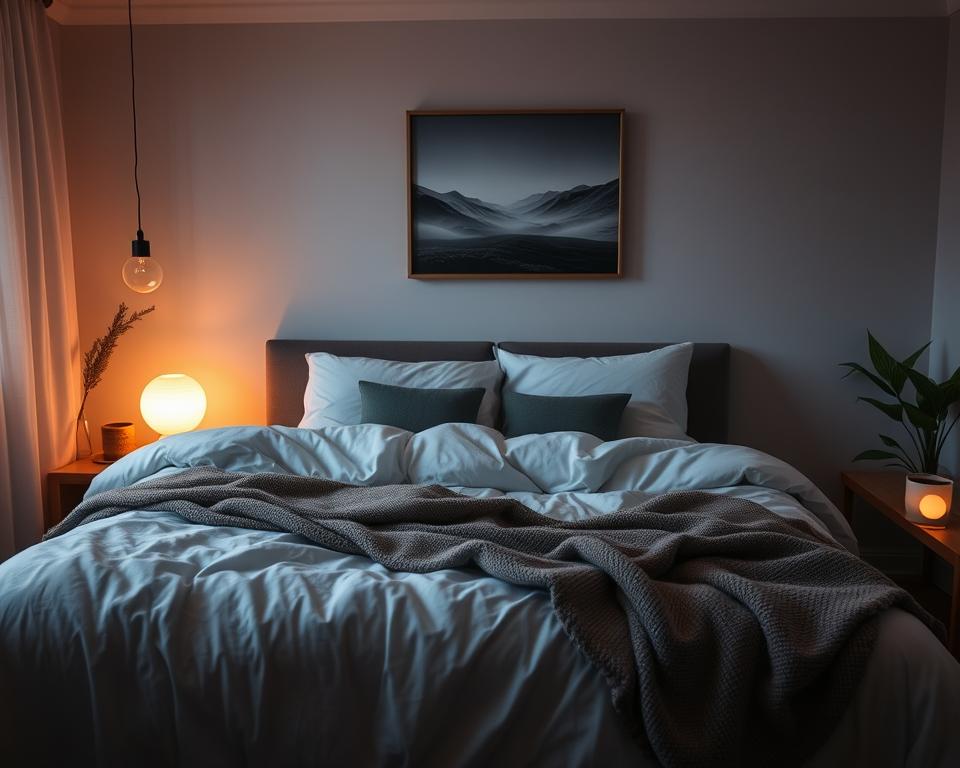Getting quality sleep is key to our health and happiness. This guide will give you tips and strategies to improve your sleep. We’ll talk about setting a regular sleep schedule and making your bedroom sleep-friendly. These tips will help you sleep better and feel refreshed.
Good sleep habits and relaxation methods like meditation help with stress. They make it easier to fall asleep and stay asleep. We’ll also look at how exercise, diet, and natural sleep aids can help you sleep better. By tackling common sleep issues with practical advice, you’ll soon enjoy deep, restful sleep.
Read more interesting information at ::thekitchenbookstore
Establishing a Consistent Sleep Schedule
Keeping a steady sleep schedule helps your body’s natural circadian rhythm. A regular bedtime routine and changing your sleep habits can make you feel more rested.
The Importance of a Regular Bedtime Routine
A steady bedtime routine tells your body it’s time to sleep. This can include relaxing activities like taking a warm bath, reading, or stretching. These activities help your mind and body get ready for sleep.
Adjusting Your Sleep Schedule Gradually
If your sleep is not regular, make small changes to your schedule. Big changes can mess up your circadian rhythm and make sleeping harder. Try going to bed or waking up a little earlier or later each day until you find what works best.
| Consistent Sleep Schedule | Inconsistent Sleep Schedule |
|---|---|
| Regulates circadian rhythm | Disrupts circadian rhythm |
| Improves sleep quality | Leads to poor sleep quality |
| Helps you feel well-rested | Can cause daytime fatigue |
By having a steady sleep schedule and a regular bedtime routine, you’re taking a big step towards better sleep. This can make you feel more awake and energized during the day.
Creating a Sleep-Friendly Environment
The sleep environment is key to getting good sleep. By making your bedroom’s temperature, lighting, and noise just right, you can make a space that helps you sleep better. This leads to better health and well-being.
Temperature Control for Optimal Sleep
Having the right temperature in your bedroom is crucial for sleep. The best temperature for sleep is between 65°F and 70°F (18°C and 21°C). A cool room helps your body keep a natural sleep cycle and lets you sleep deeply.
Lighting Matters: Minimizing Disruptive Exposure
Light, especially from devices, can mess with your sleep cycle. To help sleep better, use fewer devices before bed and keep your room dark. Use blackout curtains or an eye mask to block out light.
Minimizing Noise Disturbances
Noise can ruin your sleep. Use white noise machines, earplugs, or a fan to cover up outside sounds. Try to keep your bedroom quiet and avoid loud activities near your bed.
By focusing on the sleep environment, bedroom setup, temperature, lighting, and noise, you can make your sleep better. This leads to more restful sleep.
The Role of Exercise and Physical Activity
Regular physical activity can greatly improve your sleep quality. Exercise keeps you fit and healthy and helps regulate your sleep cycle. We’ll look at how exercise benefits sleep and how to add it to your daily routine for better sleep.
The Benefits of Regular Exercise for Sleep Quality
Exercise is great for sleep quality. Here are some ways it helps:
- Improved sleep onset: Exercise makes falling asleep faster.
- Increased sleep duration: Regular exercisers sleep longer and more deeply.
- Reduced sleep disturbances: Exercise lowers sleep disruptions and waking up at night.
- Enhanced sleep quality: Exercise improves sleep quality, making mornings feel better.
Exercise is best when done regularly and at the right time. Experts suggest moderate exercise like brisk walking, swimming, or cycling for 30 minutes a day, several times a week.
| Exercise Type | Duration | Frequency | Impact on Sleep Quality |
|---|---|---|---|
| Aerobic exercise (e.g., walking, running, cycling) | 30-60 minutes | 3-5 times per week | Improved sleep onset, duration, and quality |
| Strength training (e.g., weightlifting, resistance exercises) | 20-30 minutes | 2-3 times per week | Reduced sleep disturbances and improved overall sleep quality |
| Yoga and Pilates | 30-60 minutes | 2-3 times per week | Increased sleep duration and better sleep quality |
Remember, the best exercise plan varies by person. Always talk to a healthcare professional to find what’s best for your sleep goals and needs.
Stress Management Techniques for Better Sleep
Stress can make it hard to get a good night’s sleep. Luckily, there are ways to manage stress and get ready for sleep. Let’s look at how meditation and deep breathing can help.
Practicing Relaxation Methods
Meditation is a great way to handle stress and sleep better. It helps you focus on your breath and quiet your mind. This can lower anxiety and tension, letting your body relax. Adding a short meditation to your bedtime routine can calm your mind and body.
Deep breathing exercises are also good for reducing stress and sleeping well. Deep breaths can turn on the “rest and digest” response in your body. Just a few minutes of deep breathing before bed can make you feel more relaxed and ready to sleep.
| Relaxation Technique | Benefits for Better Sleep |
|---|---|
| Meditation | Reduces stress and anxiety, promotes mental and physical relaxation |
| Deep Breathing | Activates the parasympathetic nervous system, induces a state of calm |
Adding these stress management and relaxation techniques to your daily life can greatly improve your sleep. Taking time to unwind and prepare for sleep can help you break the cycle of stress. This leads to better sleep and a more refreshed you.
“The quality of your sleep determines the quality of your waking life. Protect it at all costs.”
– Arianna Huffington
Dietary Habits That Promote Better Sleep
Your food choices can really affect how well you sleep. Eating foods that help you sleep can change your rest for the better. But, eating too much caffeine or alcohol can mess with your sleep, making you feel tired the next day.
The Impact of Caffeine and Alcohol on Sleep Quality
A morning cup of coffee can give you a needed energy boost. But, having caffeine close to bedtime can make sleeping hard. It keeps your brain awake and alert, making it tough to relax. Alcohol might make you sleepy at first, but it can mess with your sleep later, giving you poor rest.
- Avoid caffeine-rich drinks like coffee, tea, or energy drinks in the late afternoon and evening.
- Keep your alcohol use low, especially before bed, as it can hurt your sleep quality.
Try adding sleep-promoting foods to your meals, like:
- Tart cherries, which have melatonin, a hormone that helps you sleep.
- Fatty fish like salmon, full of omega-3s that improve sleep.
- Nuts and seeds, such as almonds and walnuts, with magnesium and tryptophan for relaxation and sleep.
“Eating the right foods can make a big difference in your sleep quality. By choosing nutrient-rich, sleep-promoting options, you can set yourself up for a more restful and rejuvenating night’s sleep.”
Being mindful and balanced with your food choices can greatly improve your sleep. This can help you sleep better and feel better overall.
how to get a good rest
Getting a good night’s rest is key for our health and happiness. We’ve looked at tips and techniques to boost your sleep quality. Let’s explore key strategies to help you get the rest your body and mind need.
One top way to rest well is to stick to a sleep schedule. Go to bed and wake up at the same time every day, even on weekends. This trains your body to keep a natural sleep cycle. It leads to deeper, more restful sleep.
Also, make your bedroom sleep-friendly. Keep it dark, quiet, and cool for better sleep. Avoid screens before bed and try relaxing activities like meditation or deep breathing to calm your mind.
- Establish a consistent sleep schedule
- Create a sleep-friendly environment
- Engage in regular exercise and physical activity
- Manage stress through relaxation methods
- Optimize your dietary habits for better sleep
Use these strategies daily to improve your sleep quality. You’ll wake up refreshed and ready for the day.
| Sleep Tip | Description | Benefits |
|---|---|---|
| Consistent Sleep Schedule | Maintain a regular bedtime and wake-up time, even on weekends. | Regulates the body’s natural sleep-wake cycle, promoting better sleep quality. |
| Sleep-Friendly Environment | Ensure your bedroom is dark, cool, and quiet. | Helps you fall asleep faster and stay asleep throughout the night. |
| Exercise and Physical Activity | Engage in regular physical exercise, but avoid intense workouts close to bedtime. | Improves sleep quality and duration by reducing stress and promoting relaxation. |
Getting good rest is a journey. It might take some trial to find what works for you. By making small changes, you can greatly improve your sleep and well-being.
“Sleep is the best meditation.” – Dalai Lama

Sleep Hygiene: Dos and Don’ts
Getting good sleep is key for your health and happiness. Let’s look at the best and worst ways to sleep well. These tips can make your sleep better and help you sleep more soundly.
The Dos of Sleep Hygiene
- Stick to a regular sleep schedule, sleeping and waking up at the same time every day, even on weekends.
- Have a calming bedtime routine, like taking a warm bath, reading, or doing some light stretches.
- Make sure your bedroom is dark, quiet, and cool. The best sleep temperature is between 65-68°F (18-20°C).
- Limit screen time and blue light before bed, as it can mess with your sleep cycle.
- Do regular exercise during the day, but not right before bed.
The Don’ts of Sleep Hygiene
- Avoid caffeine, nicotine, or alcohol before bed, as they can ruin your sleep.
- Don’t take naps during the day if you have trouble sleeping at night.
- Don’t use your bed for anything other than sleeping and being with your partner, as it can break the link between your bed and sleep.
- Don’t keep looking at the clock if you wake up at night, as it can make you anxious and harder to fall back asleep.
By following these sleep hygiene tips, you can make your sleep better. This means you’ll wake up feeling refreshed and ready for the day.
Natural Sleep Aids and Remedies
If you’re having trouble sleeping, natural sleep aids and remedies might help. They offer a gentle way to improve your sleep. You can try herbal teas or sleep supplements as natural options.
The Benefits of Herbal Teas and Supplements
Herbal teas like chamomile, valerian, and lavender are known for helping you sleep better. They have calming effects that make it easier to relax and sleep well. Sleep supplements with melatonin or magnesium can also help improve your sleep.
| Natural Sleep Aid | Potential Benefits |
|---|---|
| Chamomile Tea | Reduces anxiety, promotes relaxation |
| Valerian Root | Improves sleep quality, reduces time to fall asleep |
| Melatonin Supplement | Regulates the sleep-wake cycle, helpful for jet lag |
| Magnesium Supplement | Supports healthy sleep by reducing stress and anxiety |
Before trying new sleep aids, talk to a healthcare professional. This is especially true if you have health issues or take other medicines. Even though these aids are usually safe, they must be right for you.
“Herbal teas and supplements can be a gentle, natural way to support better sleep without the potential side effects of prescription sleep medications.”
Remember, natural sleep aids should not replace good sleep habits. Keep a regular sleep schedule, create a calm sleep space, and manage stress. By doing this, you can get better sleep naturally.
Addressing Sleep Disorders and Insomnia
If you’re having trouble sleeping, you might have a sleep disorder. Sleep disorders, like insomnia, sleep apnea, and restless leg syndrome, can really affect your health. It’s key to get help from a healthcare expert.
Insomnia is the most common sleep issue. It makes it hard to fall asleep, stay asleep, or wake up too early. This leads to feeling tired, irritable, and having trouble focusing during the day.
Sleep apnea happens when your airway blocks during sleep. This stops your breathing and breaks your sleep cycle. It’s a serious condition that needs attention.
Restless leg syndrome (RLS) makes you feel like you must move your legs. This feeling is uncomfortable and can stop you from sleeping well.
| Sleep Disorder | Symptoms | Treatment Options |
|---|---|---|
| Insomnia | Difficulty falling asleep, staying asleep, or waking up too early | Cognitive-behavioral therapy, sleep hygiene practices, prescription medications |
| Sleep Apnea | Pauses in breathing during sleep, loud snoring, daytime fatigue | CPAP therapy, oral appliances, lifestyle changes |
| Restless Leg Syndrome (RLS) | Irresistible urge to move the legs, uncomfortable sensations | Medications, lifestyle changes, avoiding caffeine and alcohol |
If you keep having sleep problems or think you might have a sleep disorder, get help. A sleep specialist can check your symptoms, run tests, and make a plan just for you. This can help you sleep better.
“Sleep is the best meditation.” – Dalai Lama

The Role of Technology in Sleep Quality
In today’s world, technology affects our sleep more than ever. Devices emit blue light and cause distractions, which can mess with our sleep patterns. This can make it hard to sleep well.
Limiting Screen Time Before Bed
Too much screen time before bed is a big problem. The blue light from phones, tablets, and computers can stop our sleep hormone from working right. This makes it tough to fall asleep and hurts the quality of our sleep.
To fight this, experts say to cut down on screen time before bed. Creating a tech-free routine helps your body relax and get ready for sleep.
- Avoid using digital devices in the bedroom and keep them out of sight during your sleep hours.
- Consider installing blue light filtering apps or adjusting the display settings on your devices to minimize exposure to harmful blue light.
- Engage in relaxing, non-tech-related activities before bed, such as reading a book, practicing gentle stretching, or listening to soothing music.
“Establishing a consistent sleep routine and limiting technology use before bed can have a significant positive impact on your sleep quality and overall well-being.”
By using technology wisely and making your bedroom sleep-friendly, you can improve your sleep quality. This leads to better rest and health.
Creating a Bedtime Routine for Children
Creating a bedtime routine is key for children’s sleep and healthy sleep habits. A good bedtime routine helps kids relax, tells their body it’s time to sleep, and ensures they rest well.
Here are steps to make a bedtime routine for your kids:
- Set a consistent bedtime: Pick a regular bedtime for your child and keep it the same every night, even on weekends. This helps their body clock get ready for sleep.
- Incorporate calming activities: Add relaxing activities like reading a book, taking a warm bath, or listening to soft music. These help your child unwind and get ready for sleep.
- Limit screen time: Don’t let your child use electronic devices like TVs, smartphones, or tablets an hour before bed. The blue light from these devices can mess with their sleep cycle.
- Establish a sequence: Do the same steps every night, so your child knows it’s time for sleep. This might include putting on pajamas, brushing teeth, and saying goodnight.
- Create a cozy environment: Make sure your child’s bedroom is dark, quiet, and comfy. A good mattress and bedding can make them feel safe and help them sleep better.
With a consistent bedtime routine, you can help your kids develop healthy sleep habits. This ensures they get the rest they need to do well.
“A good night’s sleep is crucial for kids’ health. A steady bedtime routine can greatly improve their sleep quality.”
The Importance of a Comfortable Sleeping Environment
Having a comfy sleep environment is key for getting good sleep. The right mattress and bedding can greatly improve your sleep quality. This affects your physical and mental health. Let’s look at how to make your sleep area better for deep sleep.
Choosing the Right Mattress and Bedding
The mattress is the base of your sleep environment. It’s important to pick one that’s both comfy and supportive. Think about how you sleep, your body type, and what you need. A good mattress supports your spine and eases pressure points, making sleep better.
Also, the bedding you use adds to your comfort and sleep quality. Choose high-quality sheets, a supportive pillow, and a warm comforter or duvet. Go for natural materials like cotton or bamboo. They keep you cool and dry all night.
| Mattress Considerations | Bedding Recommendations |
|---|---|
|
|
Choosing the right mattress and bedding for you can make your sleep environment better. This leads to deep sleep and makes you feel refreshed every morning.
“The quality of your sleep is directly linked to the quality of your sleep environment. Invest in a comfortable mattress and bedding to ensure a good night’s rest.”
Conclusion
In this guide, we’ve shared many effective strategies and expert advice to help you sleep better. By using these tips, you can make your bedroom sleep-friendly, manage stress, and build healthy sleep habits. This will lead to more restful and refreshing sleep.
We talked about setting a regular sleep schedule and making your bedroom sleep-ready. We also covered relaxing activities and how to change your eating habits for better sleep. This guide offers a complete way to improve your sleep quality.
By adding these sleep tips to your daily life, you’re on your way to better sleep. This can greatly improve your physical, mental, and emotional health. Try these strategies and see what works for you. Start your journey to better sleep now.






